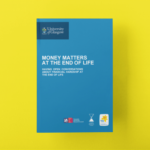
The aim of the Dying in the Margins research project has been to explore how socio-economic circumstances shape end-of-life experiences. Open conversations about financial hardship are important, and increasingly so in the context of rising poverty rates due to inflation and the cost of living crisis. Yet, throughout our study, we observed that there can be discomfort and uncertainty among professionals about how to communicate effectively with people who are facing material or financial difficulties at the end of life. Indeed, we found evidence that some health professionals preferred to use the physical environment or physical clues in the home to identify if people were experiencing financial hardship. To aid conversations and to support professionals working with people at end of life, we have developed a free resource called: Money Matters at the End of Life: Having Open Conversations about Financial Hardship at the End of Life.
As part of an Economic and Social Research Council (ESRC) Impact Acceleration Account Award (Grant No: ES/T501918/1), the project team organised a community of practice event on 24th November 2022 in which we brought together palliative care practitioners and social sector professionals to share and learn from each other about how to talk about poverty and hardship with people who are terminally ill or bereaved.
Our Community of Practice event started with a presentation by Dr Ruth Patrick from the University of York, who shared insights from her work on how people in poverty perceive and describe their situations, and how they respond to different terms and labels used by others. She also highlighted some of the challenges and dilemmas that professionals face when trying to talk to people about poverty and hardship.
We then facilitated an online discussion among the attendees, who shared and reflected on their own professional experiences and learned from the experiences of others. Key topics that were covered include:
- The importance of building trust and rapport with people before initiating conversations about poverty and hardship;
- The need to avoid making assumptions or judgments about people’s circumstances or choices;
- The benefits and drawbacks of using different terms such as ‘poverty’, ‘hardship’, ‘financial difficulties, ‘low income’, etc.;
- The role of advocacy and empowerment in supporting people to access their rights and entitlements;
- The challenges of navigating complex and often hostile systems such as welfare benefits, housing, health and social care;
- The emotional impact of working with people in poverty and hardship, and the need for self-care and peer support.
Attendees expressed strong support for the cross-sector learning and different perspectives shared at the event. We used the feedback and insights shared at the Community of Practice event to produce a practical and accessible guide for professionals on how to have open conversations about financial hardship at the end of life.
The new Money Matters at End of Life guide provides practical tips and guidance for health and social care professionals on how to initiate and conduct conversations about poverty and hardship with people who are terminally ill or bereaved, as well as signposting to relevant sources of information and support.
If you have any feedback on the resource or would like to know more about our ongoing work around financial hardship at the end of life, please contact the project team.

